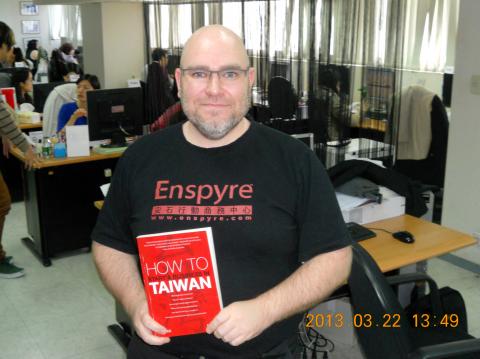Elias Ek has experienced many ups and downs doing business in Taiwan. But over the past 11 years, he has transitioned his telemarketing company Enspyre into a profitable business-to-business company with 40 employees.
Two years ago, Ek, who counts Oracle, eBay and General Motors among the companies he’s worked with, began writing a book so that expats wanting to do business in the country might capitalize on his experiences as a non-Taiwanese entrepreneur in Taiwan.
How to Start a Business in Taiwan is a step-by-step guide for starting up a company in Taiwan, and focuses on its economic and social culture, which Ek says can sometimes be tough to navigate.

Photo: Ian Stephenson
STAFF LOYALTY
Ek said that a start-up needs to get a few things right when it comes to employee benefits. He cited a company’s reputation, monthly salary and the Lunar New Year bonus as important factors influencing prospective employees.
“The work environment and a sense of accomplishment are important, but save the benefit money for salaries and Chinese New Year bonuses,” he said. Ek has done this, and found that his staff responded with warmth and loyalty.
In 2003, Ek’s Taiwanese wife passed away due to a congenital heart condition. He grieved, sought counseling and neglected his business for months.
“I was not in any condition to concentrate on the business but was lucky that a number of my employees picked up the workload,” he said.
Another challenge facing potential employers is the lack of internship programs at the university level, Ek said. But, he added, there’s a work around: start your own.
“All businesses should have an internship program as they can identify potential employees,” he said.
Over the past four years, Ek’s company has taken in 120 interns and hired 20 of them part time.
“I also asked the interns to blog about the internship so potential future interns can get an even better idea of the opportunity,” he said.
Ek also broached the topic of red tape in Taiwan. Expect large amounts of paperwork to acquire a loan for the start-up, he said. Once acquired, however, it becomes much easier to deal with the bureaucracy — provided you know how to present your projects in Chinese.
“From my own personal experience, small loans are hard to acquire for a start-up. But once the business is started the government does extend grants to companies for their next growth stage,” he said.
He added that government regulations are foreigner friendly and Taiwan is one of a handful of countries that allows foreigners to own 100 percent of the company without a local partner.
“The problem is the layer below, where local businesses are not aware of the scope of the regulations which are inclusive of foreigners,” he said.

Growing up in a rural, religious community in western Canada, Kyle McCarthy loved hockey, but once he came out at 19, he quit, convinced being openly gay and an active player was untenable. So the 32-year-old says he is “very surprised” by the runaway success of Heated Rivalry, a Canadian-made series about the romance between two closeted gay players in a sport that has historically made gay men feel unwelcome. Ben Baby, the 43-year-old commissioner of the Toronto Gay Hockey Association (TGHA), calls the success of the show — which has catapulted its young lead actors to stardom -- “shocking,” and says

The 2018 nine-in-one local elections were a wild ride that no one saw coming. Entering that year, the Chinese Nationalist Party (KMT) was demoralized and in disarray — and fearing an existential crisis. By the end of the year, the party was riding high and swept most of the country in a landslide, including toppling the Democratic Progressive Party (DPP) in their Kaohsiung stronghold. Could something like that happen again on the DPP side in this year’s nine-in-one elections? The short answer is not exactly; the conditions were very specific. However, it does illustrate how swiftly every assumption early in an

Inside an ordinary-looking townhouse on a narrow road in central Kaohsiung, Tsai A-li (蔡阿李) raised her three children alone for 15 years. As far as the children knew, their father was away working in the US. They were kept in the dark for as long as possible by their mother, for the truth was perhaps too sad and unjust for their young minds to bear. The family home of White Terror victim Ko Chi-hua (柯旗化) is now open to the public. Admission is free and it is just a short walk from the Kaohsiung train station. Walk two blocks south along Jhongshan

Francis William White, an Englishman who late in the 1860s served as Commissioner of the Imperial Customs Service in Tainan, published the tale of a jaunt he took one winter in 1868: A visit to the interior of south Formosa (1870). White’s journey took him into the mountains, where he mused on the difficult terrain and the ease with which his little group could be ambushed in the crags and dense vegetation. At one point he stays at the house of a local near a stream on the border of indigenous territory: “Their matchlocks, which were kept in excellent order,